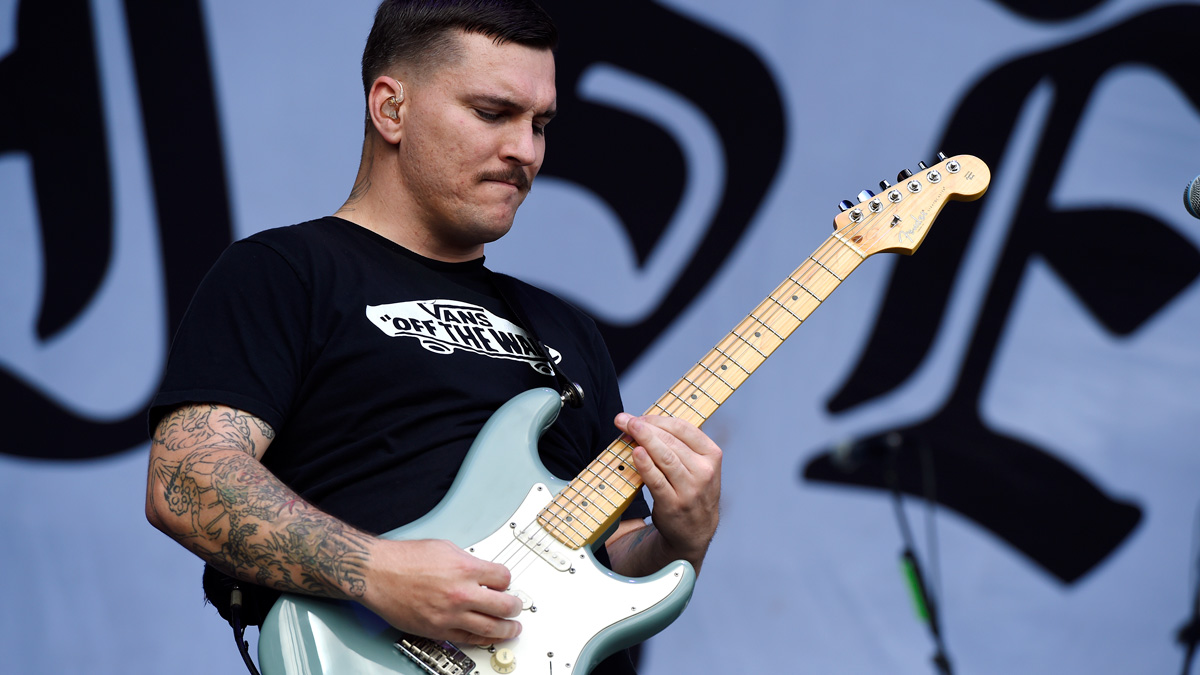The Amity Affliction's Dan Brown: why I made the switch to Fender
There’s something different about Dan Brown’s guitar tones on the Aussie metalcore heavyweights' new album - he tells us about his latest gear shift

The Amity Affliction know who they are. There’s a definite thread that links each album sonically, and while they do drift outside their established sound a little bit on each record, there’s a very essential, identifiable quality to their recorded output. You hear a chorus, and it could only be Amity.
Even counting the line-up changes that have occurred over the years, there’s a consistency to the band’s songwriting and identity. It’s on the fringes that they shake things up, and in the case of new album Misery (their sixth in total), you can hear it in longtime guitarist Dan Brown’s guitar tone.
It’s a little rounder and warmer than on previous releases, and feels like a conscious effort to put a new spin on Amity in a subtle, yet impactful way. We caught up with Brown to talk about what’s going on in the world of Amity, and what the deal is with that all-new guitar sound.
So what’s been happening since the last time we chatted?
Not much. I’m just nursing a crying baby at the moment! We just had a new baby, so our life is all about that at the moment. He’s about a week old, and our dog has just been like, “Oh no.” He’s the biggest baby of the family [laughs]!
Is this your first?
Yeah! It’s a big learning curve, but it’s been really nice. We’ve made a little cave at home and we’re doing the whole ‘mum and dad’ thing. The guys are on the Warped tour at the moment, so I missed that so I could be here for the birth and have a bit of time off.
So let’s talk about the record! Where’d you record this time?
We did it in the States, near Washington, with Matt Squire. That was a bit of a change for us. We were going to fly Matt out to Australia because we’re all here, but Matt put his foot down and said, “We’ll get a lot more out of you if you come here.” So we went back and forth and said, “Well, we’ll do pre-production in Australia then come out there,” and he said, “No. You come here.” It’s not that being at home is super distracting, but it’s just that you’ve got that one job, and that’s all you’ve got to do.

One of my favourite stories about a band going away to record is Faith No More doing Angel Dust. Mike Patton stayed up pounding coffee for like three days, then wrote “Caffeine”. You can’t really do that at home.
Well, it worked!
All the latest guitar news, interviews, lessons, reviews, deals and more, direct to your inbox!
How do you think this environment affected the record?
It always changes with the environment. It does affect the sound. That whole east coast of America has a darker vibe than if we were to go to LA to record, where it’s all happytime sunshine and beaches. But Baltimore is an older city – it’s cold and it has a harder edge. I’ve never thought about that, but I’ve recorded metal albums in Sweden before, and being the home of metal, I’m sure that had an influence.
You guys were drummerless at the start of the year…
Yeah, our friend Joe Longobardi from Defeater played on the record. He’s just a gun. He’ll be doing our next tour with us. We’re just moving slowly in that world because it’s a big commitment to get a new drummer, but he seems to be falling into this role pretty easily. He’s a really quick learner. I wrote all the music for this one, so I programmed the drums and sent them to him. He didn’t really have much input until we got into the studio, and then we would try his parts to see if they worked. If not, well, he has no ego, and he was happy to do what we needed rather than just try to impress everyone. And he really killed it. Plus, we’ve toured with Defeater, so he’s someone we know.
What guitars are you playing on the record?
I used a Fender Elite Stratocaster. I just signed up with Fender, and they just kind of said, “What do you want?” I really wanted to get a different sound for the band. Everyone uses... I won’t say what brands, because I don’t want to bag ‘em, but everyone seems to use the same guitars in this genre, and that same high-gain sound, and we’re not really a metal band anymore. It just didn’t feel right to go for that big, heavy sound, so making the switch to the Fender was a big part of that.
They just gave me the cream of the crop to take to the recording. I made a few mods on it to tune it low. I put some big, fat strings and an EverTune bridge on it to stay perfectly in tune, and I’m stoked. When I was looking at making the switch, it was between Gibson and Fender, and I thought Fender seemed a little more versatile for what we do – especially with the clean tones on the Strats. We’re always chasing that melody from the ‘80s, and those melodic clean tones were all Fenders back then.
In terms of live guitars are you going to have a bunch of Elites with EverTunes?
I’m playing a few American Pro models live. They don’t have EverTunes on them yet, but I’ll get around to having them installed. I think Drop F# is as low as we get on the album. We didn’t really go in looking for a heavy sound – it was just where the song wanted to end up. So we have to figure out which songs we’re going to play live, and I’ll probably take those two American Pros. I’ll probably start taking this Elite to do those really low tuning, because otherwise, the strings really flap around.
What about amps?
We always play with Kempers live, so we’re always trying to keep that in mind. When we’re in the studio, it’s easy to go “Let’s just use the Kemper tones,” but if you’re going to the effort of using a nice guitar with a certain sound, you have to make the decision to use real amps. We used Orange and Marshall amps, and I wrote down the tones and settings and all that, so I’m going to dial that into my Kemper to use that live. We put the Marshall through an Orange cab and the Orange through a Marshall cab, and they just did their wizardry. The Orange did most of the heavy work and the Marshall did most of the clean work. You just can’t get that Orange midrange out of a different amp.
Peter Hodgson is a journalist, an award-winning shredder, an instructional columnist, a guitar teacher, a guitar repair guy, a dad and an extremely amateur barista. He runs a blog, I Heart Guitar, which allows him to publicly geek out over his obsessions. Peter is from Melbourne, Australia, where he writes for various magazines, including Guitar World.
